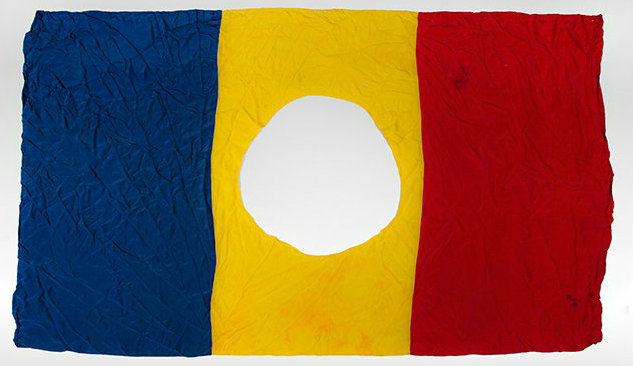
Previously trashed items that offer insight into Romanian life during the overthrow of its totalitarian dictatorship in 1989 are on display at the Vanderbilt Divinity Library, thanks to the family of faculty member David Michelson.
The exhibition “Scrounging through the Trash Heap of History: 30 Years since the Fall of Communism in Romania” is displayed in six cases: two outside of the Divinity Library’s reference room and other four in the rotunda next to the office suite.
Michelson, who is an associate professor of the history of Christianity and classical and Mediterranean studies at Vanderbilt, was 14 when his father, Paul, was awarded a Fulbright Scholarship in 1989. The Michelson family relocated from the United States to Bucharest for the academic year, where they observed firsthand the violent collapse of the Communist government of Nicolai Ceaușescu. The protests began on Dec. 15, 1989, in the city of Timișoara, and spread to Bucharest on Dec. 21.
As anti-Communist demonstrators ransacked the party’s headquarters, protestors burned and trampled propaganda and paraphernalia of the Ceaușescu regime. With help from friends, the Michelson family scavenged these memorabilia as evidence of the repressive regime and the difficulty of everyday life.
“The exhibit uses these discarded materials not only to tell the story of the dramatic events of 1989, but also to shed light on repression under the Ceaușescu dictatorship,” said David Michelson. Items in the exhibition include spent ammunition from the fighting, Romanian flags with their Communist emblems torn out, and a single shoe from a protestor believed to have been killed by the feared “Securitate” secret police.

“We also collected books and medals that illustrate the absurd extremes of propaganda in the ‘Golden Epoch of Ceaușescu,’” the younger Michelson said.
Looking back, Michelson recalls watching with his father as history unfolded on the streets of Bucharest. “Harrowing images from those events of 1989-90 remain vivid in my mind,” he said. “Seeing the violence of political repression up close has driven my interests in history and made me curious about politics, religion and how human beings treat each other in society.”
He noted that while other nations behind the Iron Curtain—Poland, Hungary, Czechoslovakia and East Germany—toppled oppressive regimes in 1989, the Romanian experience both before and during 1989 was particularly marked by state violence. “Thirty years after the fall of the Romanian Socialist Republic, it is important to preserve the memory of its atrocities and to recognize its victims,” he said.
The exhibit has been created through the work of multiple generations of the Michelson family including Anna and Joel Michelson, two of Paul Michelson’s grandchildren. The curators are also grateful for the assistance of the late Sanda Romașan, a woman who never gave up hope in freedom and collected many of the discarded items.
The exhibition, which recently opened with a lecture by Paul Michelson, Distinguished Professor of History at Huntington University, will be on display through May 31, 2020. It is co-sponsored by the Jean and Alexander Heard Libraries and Vanderbilt Divinity School.
For more information, email David Michelson or call Divinity Library Exhibit Curator Charlotte Lew at 615-322-2566.